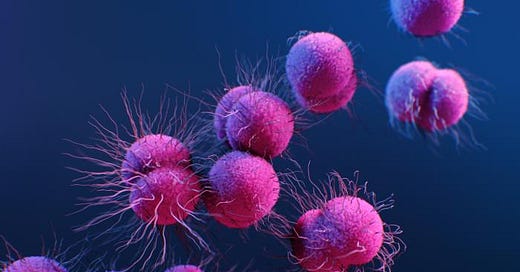In March 2025, three cases of gonorrhea with rare multidrug resistance of the pathogen Neisseria gonorrhoeae (NG) were reported to the Robert Koch Institute (RKI).
These cases involved resistance to the therapeutically important third-generation cephalosporins ceftriaxone and cefixime according to the currently valid AWMF guideline (Association of Scientific Medical Societies) as well as high-level resistance to azithromycin. The pathogens were also resistant to ciprofloxacin and tetracycline.
The affected men were men from the North Rhine-Westphalia area with symptomatic urethritis and a wide age range (18–65 years). They reported heterosexual contact as the route of infection. For one case, it is known that there was local contact with a sex worker, and for another case, local contact with a sex worker is suspected. For the third case, it is unknown whether the infection occurred in Germany or abroad. An epidemiological link between the cases could not be established based on the available data.
In all three cases, guideline-compliant treatment with ceftriaxone was administered, and in two cases in combination with azithromycin. In one of the cases, it is known that the infection was cured, and another case is clinically asymptomatic but refused microbiological treatment monitoring. For the third case, no information on treatment success is currently available.
The corresponding isolates of the pathogen were further characterized as part of the voluntary, sample-based gonococcal resistance surveillance (Go-Surv-AMR)2 programor at the RKI's consulting laboratory for gonococci. Two of the isolates were recultured and examined in detail phenotypically and genotypically. The resistance profiles of the NG isolates were confirmed.
Subscribe to Outbreak News TV on YouTube
Next-generation sequencing revealed that thetwo NG isolates are genetically almost identical, which raises suspicion of a connection between the cases. Since then, no further cases with a comparable resistance profile have been reported to the RKI. However, it is assumed that there is a significant underreporting of resistant NG in Germany. In the majority of cases, gonorrhea is diagnosed using nucleic acid testing (e.g., PCR), which does not allow for conclusions about susceptibility to common antibiotics. However, with few exceptions, additional culture is necessary for susceptibility testing, as required by the current guidelines. Furthermore, if possible, microbiological monitoring of treatment success should always be performed, as well as notification of partners, including diagnostics and, if necessary, treatment.
If NG isolates with cephalosporin or multidrug resistance are detected, or if treatment failure is suspected, we ask that you contact the Gonococcal Advisory Laboratory at the RKI as soon as possible at kl-gonokokken@rki.de for diagnostic and treatment advice.





